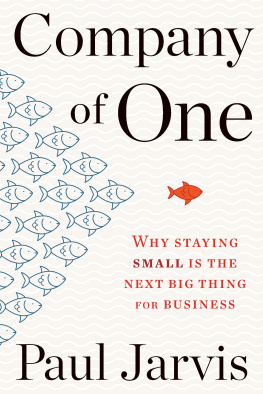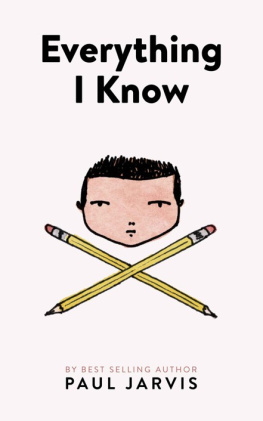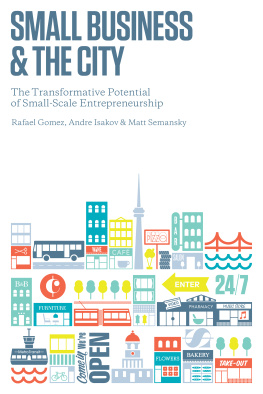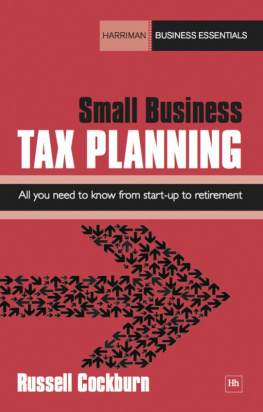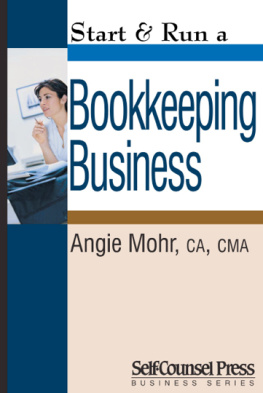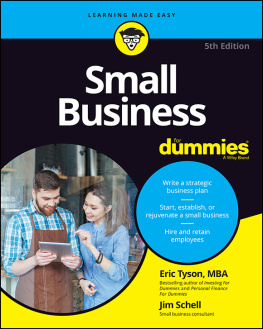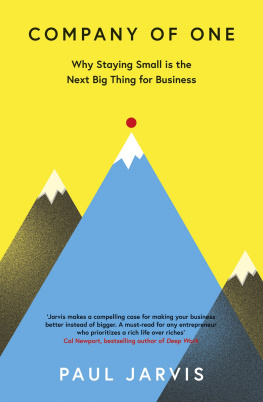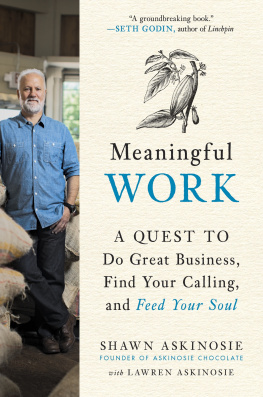Copyright 2019 by Paul Jarvis
All rights reserved
For information about permission to reproduce selections from this book, write to or to Permissions, Houghton Mifflin Harcourt Publishing Company, 3 Park Avenue, 19th Floor, New York, New York 10016.
hmhbooks.com
Library of Congress Cataloging-in-Publication Data
Names: Jarvis, Paul (Business writer), author.
Title: Company of one : why staying small is the next big thing for business / Paul Jarvis.
Description: Boston : Houghton Mifflin Harcourt, [2019] | Includes bibliographical references and index.
Identifiers: LCCN 2017061483 (print) | LCCN 2018001193 (ebook) | ISBN 9781328972378 (ebook) | ISBN 9781328972354 (hardcover)
Subjects: LCSH: Small business. | Strategic planning.
Classification: LCC HD2341 (ebook) | LCC HD2341 .J37 2019 (print) | DDC 658.02/2dc23
LC record available at https://lccn.loc.gov/2017061483
e ISBN 978-1-328-97237-8
v1.1218
For Luna
Theres no such thing as perpetual growth. Yet thats what traditional business people crave. But what is growth meant to achieve? If Oxford University is so successful, then why isnt there a branch in Washington, D.C.? If a symphony is successful with 120 musicians, why not even more so with 600? To grow bigger is not much of an effective business strategy at all.
RICARDO SEMLER, CEO OF SEMCO PARTNERS
Prologue
On February 28, 2010the final day of the Winter Olympics in VancouverI found myself driving a tiny cube-van with my wife, Lisa, heading to a ferry terminal. We had just closed on the sale of our condo, a small glass box in the sky located right in the heart of downtown Vancouver. We had also sold or donated almost all of our possessions, and we were moving to a town in the middle of nowhere, literally at the end of the road on Vancouver Island.
Our new townTofinowas proudly billed as life on the edge. As in truly the edge of nowhere. This island is the setting for the reality TV show Alone, where the actors grapple with living and surviving in complete isolation; its filmed a few hours north of town. Fewer than 2,000 people live in Tofinomostly surfers, old draft dodgers, and other assorted hippies who are still very happy living in the twentieth century.
At the timebefore, after, and even during the moveI was working entirely online as a designer and online business consultant to everyone from Mercedes-Benz to Microsoft to Marie Forleo. My work and life depended on being hyperconnected. But now I was trading all of that for a town with zero other people involved in tech and, even worse, a really awful internet connection.
In short, for someone like myself who was coming from the tech world, this move was going to be a bit of a massive adjustment.
The main reason I was hell-bent on leaving civilization was that I had simply had enough of business as usual city life and the constant push from others to grow my successful business into something bigger. My wife, Lisa, too, was sick of her daily career demands. We were both done with the constant stimulus and stress of our urban existencethe lights, sounds, and distractions, the constant and incessant buzzing. To save our sanity, we made our escape as quickly as we possibly could. And living on Vancouver Island seemed like the perfect tonic.
Yet we soon learned that living in the woods on an island does something funnyit forces you to go deep within your own thoughts. Theres not a whole lot else you can do, especially if you dont have a television or even Netflix. And at first, exploring your own thoughts is one of the scariest things in the world. (A study at the University of Virginia by Timothy Wilson found that people would rather get electric shocks than simply be alone with their thoughts.) But then again, if you sit with your thoughts for a while, they can reveal some mind-set-changing ideas.
But scaling down wasnt just a plan for getting rid of our physical belongings; it was also a plan for achieving mental clarity. In creating a personal life that was bare of all but the essentials, parallels to my work started to become evidentwhat was truly necessary and what wasnt. By decluttering my thoughts (creating an inbox zero for my brain, if you will), I was able to look at my day-to-day business much more clearly because the distractions were now gone. I hadnt been able to clearly express my reasons for the way I had been working until that moment.
This clarity highlighted something I had unconsciously been doing for nearly twenty years, even before going out on my own, and that was building a business full of resilience, driven by a desire for autonomy and, on most days, enjoyment. In other words, by scaling down every aspect of my life, I realized this was how I had successfully built my business all along. I had benefited immensely by resisting the typical avenues of growth and business expansion. (Hey, I was able to move to the woods on an island.) And now, for the very first time, I understood why.
I had been building a company of one.
INTRODUCING A COMPANY OF ONE
At first, I felt alone in my assumption that more isnt always better. But then, during the writing of this book, I found that there is an amassing army of others who feel very much the same, and whose business decisions are backed up with growing research and studies. It turns out that some of the most successful brand-name companies and individuals are companies of one at heart.
Living in Tofino gave me the opportunity to take up a daily ritual of going for a morning surf. One day I was out in the lineup (the place just in front of the breaking waves where surfers wait to catch rides) with my accountant friend. We were sitting out there, waiting for the next decent wave, and he turned to me and said, Im stoked! Ive just about made enough to take the rest of the year off to go rock climbing. It was August. Puzzled by what he said, I missed the next few waves that rolled by. Once he paddled back to the lineup, where I still was, he explained that he had calculated what he needed to make in profit in order to cover his cost of living and put a decent amount of money into investments. He had figured out the amount of wealth he needed to be comfortable and didnt feel the need to accumulate more.
Past that, he didnt need any more moneyso hed stop working when he hit his enough amount and travel for the rest of the year. He didnt want to grow his accounting business into a bigger company with employees and offices in every city. If he did, his enough number would also grow, from having to manage more employees and a bigger business. He wouldnt be able to spend as much time rock climbing (or surfing). His focus in his business was being better, not growing bigger. I quickly began to realize that I had adopted a similar mind-set: I knew what I needed to make to cover my business and my life, so I could decide to slow down when I reached enough as well.
Its assumed that hard work and smart thinking always result in business growth. But the opposite is often true: not all growth is beneficial, and some growth can actually reduce your resilience and your autonomy. Just as I learned new skills in self-sufficiency that were far outside my realm of knowledge, companies of one can do the same. Indeed, theyll need to in order to stand out and thrive.
In truth, embracing growth appears to be the easier route more often than not, since its easier to throw more at any problem that might pop up. Want more customers? Hire more employees. Need more revenue? Spend more. Fielding more support requests? Build a bigger support team. But scaling up might not be the best or smartest solution to the basic problem. As a means to generating higher profits, what if you acquired more customers simply by creating more efficiency, so you didnt have to hire more people? What if you generated more revenue by finding a way to spend less (again, for higher profits)? What if you responded to the growth in support requests by finding a better way to teach your customers how to use what you sell, so they didnt have to ask questions as often? What if you didnt have to work more hours to finish a project but just more efficiently, so you could then enjoy more of your life away from work?

